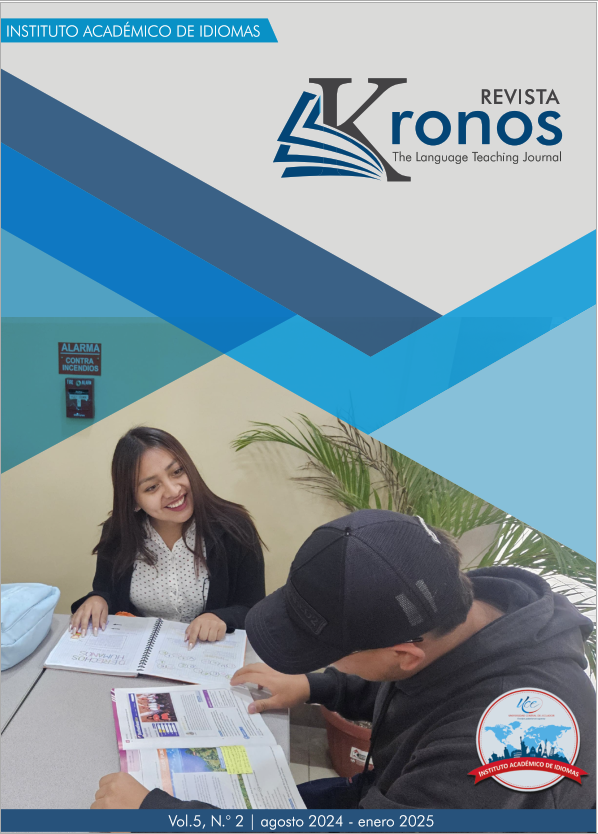The Influence of Peer-Assessment in Improving Speaking Skills in B1 learners
DOI:
https://doi.org/10.29166/kronos.v5i2.6801Keywords:
Peer-assessment, Speaking Skills, Fluency, English as a Foreign LanguageAbstract
This action research explores how peer-assessment can enhance the speaking skills of B1 English learners. The participants of this study are university students, and they have previously studied English at a language school in Samborondon, Guayas. The project was carried out online within a time frame of 4 weeks, a four-hour lesson per week. This is a pre/posttest design study, which evaluates students’ improvement of oral production skills by implementing the peer-assessment technique. The aim of this study is to answer the questions: 1. To what extent does the use of peer assessment improve speaking in B1 level students? For which quantitative data collection methods were applied. On the other hand, a survey was used to answer the qualitative question: What are students’ perspectives regarding peer-assessment and their speaking? The research revealed that peer-assessment does have a significant influence on B1 learners’ speaking skills, as their grades in the posttest raised and some factors such as grammar and pronunciation were enhanced. Therefore, the current study should be used as a guide for teachers whose aim is to get their students to be fluent in English.
Downloads
References
Alfonso, E. (2021). The importance of teaching English pronunciation in Spanish schools. Universidad de la Laguna Repository, 2-4. http://riull.ull.es/xmlui/handle/915/22905
Avison, D., Lau, F., Myers, M. and Nielsen, P.A. (1999). Action research. Communications of the ACM, 42(1), 94-97. https://doi.org/10.1145/291469.291479 DOI: https://doi.org/10.1145/291469.291479
Brown, G. (2015). Self and peer assessment. Assessment & Grading Seminar Series. http://hdl.handle.net/2292/28140
Caicedo Álvarez, O. A. (2016). The effects of peer-correction and peer-assessment on students’ spoken fluency (Master's thesis, Universidad de La Sabana). http://hdl.handle.net/10818/25057
Divjak, B., & Maretic, M. (2017). Learning Analytics for Peer-assessment: Disadvantages, Reliability and Implementation. JIOS, 4(1), 21-31. https://doi.org/10.31341/jios.41.1.2 DOI: https://doi.org/10.31341/jios.41.1.2
Fauzan, U. (2014). The use of improvisation technique to improve the speaking ability of EFL students. DINAMIKA ILMU, 14(2), 264-270 https://doi.org/10.21093/di.v14i2.17 DOI: https://doi.org/10.21093/di.v14i2.17
Hasnani, H., & Mubarak, H. (2020). The use of peer-Assessment in enhancing ESP students' speaking ability. Ethical Lingua: Journal of Language Teaching and Literature, 7(1), 74-81. https://doi.org/10.30605/25409190.135 DOI: https://doi.org/10.30605/25409190.135
Hyoung, S. (2016). Self- and peer- assessment of speaking. Studies in Applied Linguistics and TESOL, 16(2), 69-76. https://doi.org/10.7916/salt.v16i2.1257
Jambari, O., Khaerina, R., Siswanto, P., Nugroho, A., Nehe, B., Nurhayati, N., & Cahyono, H. (2021). The correlation between students' vocabulary mastery and students' speaking skill. Atlantis Press, 535, 102-104. 10.2991/assehr.k.210304.023 DOI: https://doi.org/10.2991/assehr.k.210304.023
Leong, L.-M., & Ahmadi, S. M. (2017). An analysis of factors influencing learners' English-speaking skill. International Journal of Research in English Education, 2(1), 34-41. https://doi.org/10.18869/acadpub.ijree.2.1.34 DOI: https://doi.org/10.18869/acadpub.ijree.2.1.34
Li, J., Huang, J., & Cheng, S. (2022). The reliability, effectiveness, and benefits of peer assessment in college EFL speaking classrooms: Student and teachers’ perspectives. Studies in Educational Evaluation, 72, 101-120. https://doi.org/10.1016/j.stueduc.2021.101120 DOI: https://doi.org/10.1016/j.stueduc.2021.101120
Meletiadou, E. (2021). Exploring the impact of peer-assessment on EFL students' writing performance. IAFOR Journal of Education: Language Learning in Education, 9(3), 80-81. https://eric.ed.gov/?id=EJ1302975 DOI: https://doi.org/10.22492/ije.9.3.05
Ministerio de Educacion. (2019). National English curriculum guidelines. lengua-extranjera/
Musfirah, Y. (2019). The use of peer-assessment in speaking skill. English Education Journal, 10(1), 68-76. https://jurnal.usk.ac.id/EEJ/article/view/13257
Ndoye, A. (2017). Peer/self-assessment and student leaning. International Journal of Teaching and Learning in Higher Education, 29(2), 255-269. https://eric.ed.gov/?id=EJ1146193
Oviedo, N., & Mena, J. (2021). Communicative language teaching approach in the development of speaking skill. Ciencia Digital, 5(4), 6-26. https://doi.org/10.33262/cienciadigital.v5i4.1865 DOI: https://doi.org/10.33262/cienciadigital.v5i4.1865
Power, J. R., & Tanner, D. (2023). Peer assessment, self-assessment, and resultant feedback: an examination of feasibility and reliability. European Journal of Engineering Education, 48(4), 615-628. https://doi.org/10.1080/03043797.2023.2185769 DOI: https://doi.org/10.1080/03043797.2023.2185769
Prastika, A. (2020). The use of peer-assessment technique to improve speaking performance of junior high school students of Gula Putih Mataram in academic year 2019/2020. Mataram. https://repository.metrouniv.ac.id/id/eprint/1488
Quimi, S. (2024). The influence of formative peer-assessment to develop speaking fluency for EFL students. http://dspace.casagrande.edu.ec:8080/handle/ucasagrande/4583
Rao, P. S. (2019). The importance of speaking skills in English classroom. Alford Council of International English & Literature Journal, 2(2), 6-18. https://www.researchgate.net/publication/334283040_THE_IMPORTANCE_OF_SPEAKING_SKILLS_IN_ENGLISH_CLASSROOMS
Samouni, A. (2023). Peer-assessment of the writing skill in the Moroccan EFL context: The attitudes and perceptions of students and teachers at Sultan Moulay Slimane University as a case study. Research Gate.
http://dx.doi.org/10.13140/RG.2.2.27256.42242
Seifert, T., & Feliks, O. (2019). Online self-assessment and peer-assessment as a tool to enhance student-teachers' assessment skills. Assessment & Evaluation in Higher Education, 44(2), 169-185. https://doi.org/10.1080/02602938.2018.1487023 DOI: https://doi.org/10.1080/02602938.2018.1487023
Sevy-Biloon, J., Cajamarca, T., & Avila, A. (2023). Enhancing comprehension and motivation in lower level Ecuador EFL students: An action research study of three reading strategies at UNAE. European Journal of Foreign Language Teaching, 7(2), 103-104. http://dx.doi.org/10.46827/ejfl.v7i2.4992 DOI: https://doi.org/10.46827/ejfl.v7i2.4992
Stancic, M. (2021). Peer assessment as a learning and self-assessment tool: a look inside the black box. Assessment & Evaluation in Higher Education, 46(6), 852-864. https://doi.org/10.1080/02602938.2020.1828267 DOI: https://doi.org/10.1080/02602938.2020.1828267
Tarigan, K., & Stevani, M. (2022). English teachers' beliefs in teaching grammar to improve students' speaking skill. Journal of English Language and Education, 22(1), 131-132.
https://www.jele.or.id/index.php/jele/article/view/236
White, E. (2009). Students’ perspective of peer Assessment for learning in a public speaking course. Asian EFL Journal, 33(1), 1-36. http://asian-efl-journal.com/pta_January_09.pdf.
Yan, Z., Lao, H., Panadero, E., Fernandez, B., Yang, L., & Yang, M. (2022). Effects of self-assessment and peer-assessment interventions on academic performance: A meta-analysis. Educational Research Review, 37, 3-4. https://doi.org/10.1016/j.edurev.2022.100484 DOI: https://doi.org/10.1016/j.edurev.2022.100484
Zhussupova, R., & Shadiev, R. (2023). Digital storytelling to facilitate academic public speaking skills: case study in culturally diverse multilingual classroom. Journal of Computers in Education, 10(3), 499-526. https://doi.org/10.1007/s40692-023-00259-x DOI: https://doi.org/10.1007/s40692-023-00259-x
Published
How to Cite
Issue
Section
License
Copyright (c) 2025 Dayana Torres

This work is licensed under a Creative Commons Attribution-NonCommercial-ShareAlike 4.0 International License.












